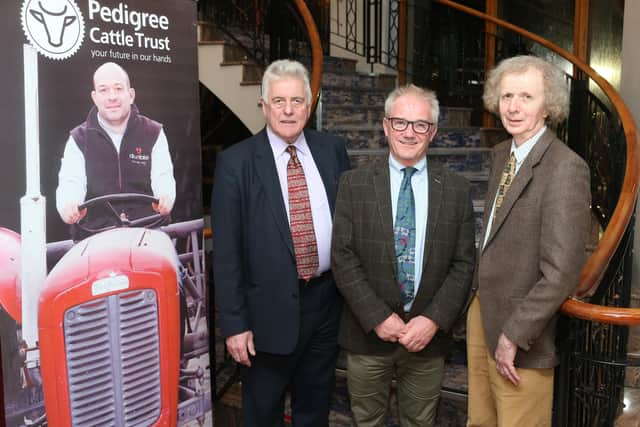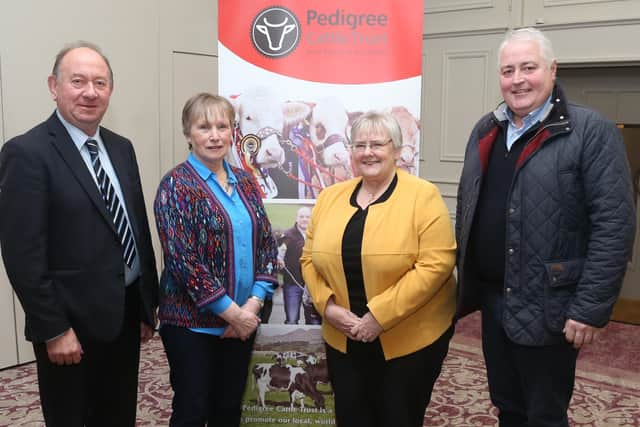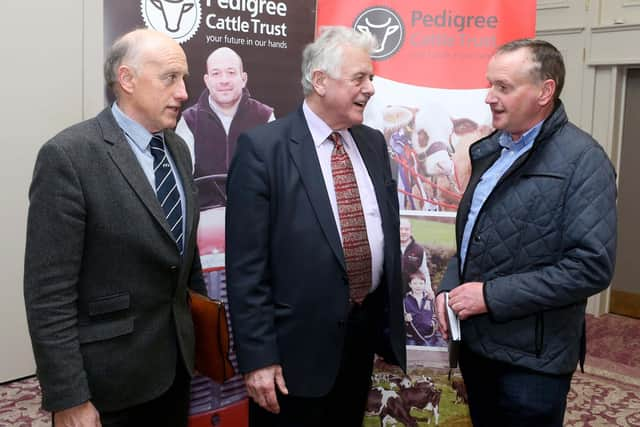Officials urged to ‘re-think’ bTB strategy


The motion was carried at the recent Pedigree Cattle Trust meeting in Portadown, when Devonshire vet Dr Dick Sibley highlighted that slurry is a major reservoir for Mycobacterium bovis and acts as a vector in the spread of the disease.
Dr Sibley has conducted clinical trials at Gatcombe Farm in Devon, and his pioneering research has yielded impressive results.
Advertisement
Advertisement
The farm suffered chronic endemic infection for almost a decade, but thanks to Dr Sibley’s intervention has been declared officially bTB free.


Dr Sibley’s ‘alternative approach’ identifies the weaknesses in the statutory SCITT skin test (Single Comparative Intradermal Tuberculin Test) which checks for immunity against exposure, but doesn’t determine if an animal is infected or infectious.
“The current skin test is outdated and simply isn’t good enough! It was designed 50 years ago when average herd size was 25 cows.
“The UK herd size has increased and farming has intensified, but the government’s control policy has been left behind,” explained Dr Sibley.
Advertisement
Advertisement
“It is interesting to note that only three countries in the EU currently use the skin test, and that no country has ever eradicated TB using this test. Our trials have clearly demonstrated that the skin test leaves behind a significant number of infected and infectious animals.


“In fact, the test only finds around fifty per-cent of ‘latent’ cattle. Our research has identified that at least fifteen per-cent of these ‘missed’ animals are shedding the bTB organism in their faeces.”
Dr Sibley used a number of enhanced tests such as Idexx Elisa, Actiphage, and qPCR, to determine the infection risk that these missed and shedding cattle pose to the environment.
“There are an array of tests available, and it doesn’t need to be complicated, but it is very clear that ‘infectious’ cows can spread the Mycobacterium bovis organism in their faeces. Adult cattle produce 45 to 50kgs of faeces per day, and we were finding 1,000 organisms per gram in the faeces of ‘shedding’ cows.
Advertisement
Advertisement
“This is a very clever and persistent pathogen. It doesn’t need a live host and can live in slurry for at least ten months. However, it is interesting to note that it can’t survive in farmyard manure, as the composting process acts as a sterilizer.“


Dr Sibley’s message is clear – infectious and shedding cattle need to be identified, isolated and culled, as they pose a high risk and are perpetuating the problem. “There is no point in continuing with the current statutory regime, it clearly isn’t working! The fight against bTB needs to move to another level.”
As a vet Dr Sibley is focused on ensuring the health, welfare and productivity of animals.
“Badgers play a role, but ‘experts’ are naive to think that wiping out badgers will solve the problem outright.
Advertisement
Advertisement
“We identified a high level of bTB within the badger population at Gatcombe. They are exposed to slurry, and do transmit disease between herds.


“The badgers in TB hotspot areas should be tested, culled if infected, and vaccinated to maintain a clean population.”
Brian Walker, chairman of the Pedigree Cattle Trust, said that bovine tuberculosis is a frustrating problem for farmers in Northern Ireland. “The problem of TB has been raging for decades and it isn’t being resolved.
“DAERA officials need to deal with the issue. Not only is it costing the public purse £40m annually, it is causing heartache and financial hardship to farming families across the country.
Advertisement
Advertisement
“Intensive dairy farming brings increasing risks, and we must manage the slurry problem for disease control and for environmental consequences.”
He added: “NI beef has already been rejected by China because of the severity of the bTB problem, and in recent times pedigree breeders are returning from the multi-breed bull sales in Scotland, having experienced a decline in the demand for their genetically superior bulls.
“It is obvious that NI-bred stock is being discriminated against because of the prevalence of bTB. Our industry is in a vulnerable position, especially as the consequences of Brexit are still looming.


“I welcome the comments from Minister Edwin Poots that one of his key priorities is to implement new measures as part of a clear strategy to reduce bTB in Northern Ireland.”
Advertisement
Advertisement
Brian Walker concluded: “We are awaiting the publication of the new bovine TB eradication strategy. For sixty years the Department has failed to eradicate the disease. Nevertheless, we will support any new initiative which is based on sound scientific evidence. We will also retain independent experts to assist us in any consultation response.
“Farmers have suffered significant losses. As a group working on behalf of pedigree cattle breeders, I would urge the ‘experts’ to digest Dr Sibley’s research, and call on the Minister to commission a similar trial on persistently infected herds in Northern Ireland.
“This process can proceed in tandem with any new proposals from the Department. We do not wish to compete with the Department.
“We seek positive co-operation, and cannot stress sufficiently how much we appreciate the positive response of the Minister to this crisis.”